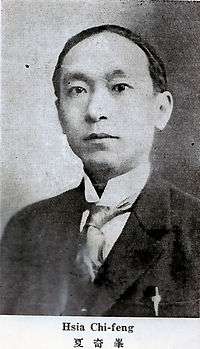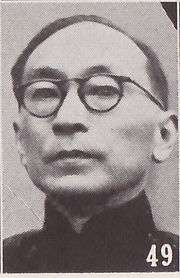Xia Qifeng

Xia Qifeng (simplified Chinese: 夏奇峰; traditional Chinese: 夏奇峯; pinyin: Xià Qífēng; Wade–Giles: Hsia Ch'i-feng; 1888[1] – September 12,[2] 1961) was a politician, diplomat and journalist in the Republic of China. He engaged in foreign affairs in the Beiyang Government and the Nationalist Government. In the end, he became an important politician during the Reformed Government of the Republic of China and the Reorganized National Government of China (Republic of China-Nanjing). His former name was Yun (雲). He was born in Taizhou, Jiangsu.
Biography

In 1911 Xia Qifeng graduated from the Nanhui Middle School, and entered the Jiangsu High School (江蘇高等學堂). Having graduated from this High school in 1914, he went to France two year later in "Diligent work and Economical study" (勤工儉學). Until 1919 he engaged in translation.
Later he returned to China, was appointed labor and diplomatic editor of the Eastern Times in 1919 and assisted in the organization of the Returned Chinese Laborers Association, whose president he became.[3] In 1921 Xia Qifeng went to Europe again as special correspondent for Eastern Times in France (Paris) and Switzerland. He also became unofficial publicity agent for the Chinese delegation to the League of Nations at Geneva 1923-28. In 1923 he was appointed a clerical employee of the League of Nations Secretariat.[4] In 1928 he returned to China, and became a reporter of Daily Revolution (革命日報). From 1932 until 1934, he worked as a member of the Ministry for Foreign Affairs' Treaty Commission in the Nationalist Government.
In March 1938 Liang Hongzhi established the Reformed Government of the Republic of China. Xia Qifeng also participated in it, and was appointed Vice-Minister for the Interior. In September 1938 the Reformed Government and the Provisional Government of the Republic of China organized the United Council of the Republic of China (中華民國政府聯合委員會), Xia was appointed Deputy Manager of the General Office.[5] In August 1939 he was appointed acting Minister for Foreign Affairs in the Reformed Government.
After the Wang Jingwei regime was established in March 1940, Xia Qifeng was appointed Chief of the Auditing Bureau of the Control Yuan (監察院審計部部長). In December he was elected Central Executive Member of the Kuomintang (Wang's clique). He also held the positions of Member of the Committee for requisitioning French settlement in April 1943, and Member of the Committee for abolition of extraterritorial rights in January 1945.
After the Wang Jingwei regime had collapsed, Xia Qifeng was arrested by Chiang Kai-shek's National Government in Shanghai. He was convicted of treason and surrender to the enemy (namely Hanjian) and sentenced to life imprisonment by the Suzhou High Court in October 1945. He was served his sentence in Shanghai. After the People's Republic of China had been established, his treatment did not change.
Xia Qifeng died in prison on September 12, 1961.
Works
In 1931 Xia Qifeng and Li Shi (李實) translated Richard Nikolaus von Coudenhove-Kalergi's Pan-europa (Chinese Title was 歐洲合眾國), and published from Dadong Shuju (大東書局) in Shanghai.
Notes
- ↑ By History of Prison in Shanghai. Xu Youchun (main ed.), p.1137 wrote "1887". Committee for Problems of East Asia, The Biographies of Most Recent Chinese Important People, p.32 and Who's Who in China 5th ed., p.84 wrote "1889".
- ↑ By History of Prison in Shanghai. Xu (main ed.) op. cit. wrote "September 11".
- ↑ According to Committee for Problems of East Asia, op. cit. and Who's Who in China 5th ed. Xu (main ed.), op. cit. he became a writer and correspondent of Shanghai Shibao (Times) (上海時報).
- ↑ According to Xu (main ed.), op. cit. Committee for Problems of East Asia, op. cit. he was "an agent (情報部員) of the League of Nations".
- ↑ Xu (main ed.), op. cit. Committee for Problems of East Asia, op. cit. wrote "the Manager of the General Office".
References
| Wikimedia Commons has media related to Xia Qifeng. |
- Xu Youchun (徐友春) (2007). Xu Youchun (徐友春), ed. 民国人物大辞典 增订版 [Unabridged Biographical Dictionary of the Republic, Revised and Enlarged Version] (in Chinese). Hebei People's Press (Hebei Renmin Chubanshe; 河北人民出版社). ISBN 978-7-202-03014-1.
- 中國名人錄 第五版 [Who's Who in China 5th ed.] (in Chinese). The China Weekly Review (Shanghai) (上海密勒氏評論報). 1936.
- History of Prison in Shanghai (上海监狱志) The Office of Shanghai's History (上海地方志办公室) Website
- Liu Shoulin (刘寿林) (etc.ed.) (1995). 民国职官年表 [Republic of China Official Chronology] (in Chinese). Zhonghua Book Company (Zhonghua Shuju; 中华书局). ISBN 7-101-01320-1.
- Committee for Problems of East Asia (東亜問題調査会) (1941). 最新支那要人伝 [The Biographies of Most Recent Chinese Important People] (in Japanese). Asahi Shimbun.
| Political offices | ||
|---|---|---|
| Preceded by Lian Yu |
Minister of Foreign Affairs (Reformed Government of the Republic of China) August 1939 – March 1940 |
Succeeded by dissolution of the Reformed Government |
| Preceded by office established |
Chef of the Auditing Bureau (Nanjing Nationalist Government) 1940 – March 1945 |
Succeeded by office abolished |